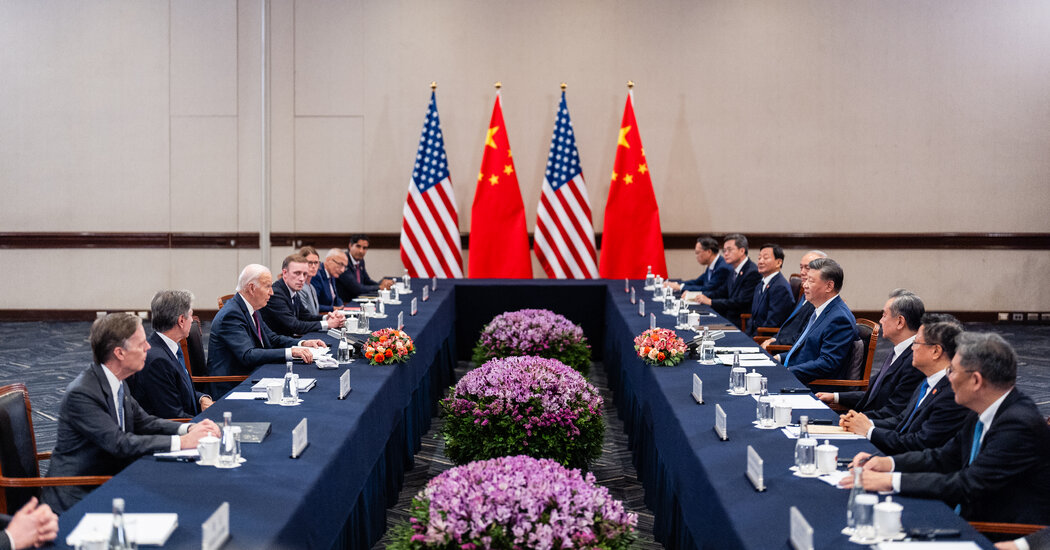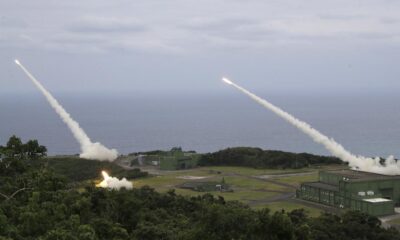Breaking News
R. Nicholas Burns, U.S. Ambassador, Says China Is Aligned With ‘Agents of Disorder’

The United States ambassador to China, R. Nicholas Burns, has stated that the Biden administration is making a final effort to convince China to cease transferring equipment to Russia for the war in Ukraine.
During an interview at the U.S. embassy in Beijing, Mr. Burns revealed that nearly 400 Chinese companies have provided Russia with dual-use products, which have both military and commercial applications. He also mentioned that China has supplied 90 percent of the microelectronics used in the Russian war efforts.
With less than two weeks before President-elect Donald J. Trump assumes office, Mr. Burns is addressing the administration’s concerns regarding Russia, as well as China’s alignment with Iran and North Korea, in a series of meetings with Chinese ministers this week and early next week. He is set to depart the country next Tuesday.
On a broader scale, Mr. Burns noted that China’s policies towards Russia, Iran, and North Korea are not in line with Beijing’s aspiration to play a leading role in global initiatives like the World Trade Organization and the Paris agreement on climate change.
“Their actions are disruptive because they’re aligning themselves with the most unreliable agents of disorder in the international system,” he said. “So the Chinese can’t have it both ways; they’ve got to make a decision here.”
Mr. Burns also emphasized that China, a significant buyer of oil from Iran, should leverage its influence to demand that Iran prevents the Tehran-backed Houthi militia from targeting commercial shipping in the Red Sea.
This week, Mr. Burns met with senior officials, including Ma Zhaoxu, the executive vice foreign minister, and Liu Jianchao, who oversees the international department of the Chinese Communist Party and is expected to become the next foreign minister. Additional meetings are scheduled for next week.
While China’s Ministry of Foreign Affairs has not responded immediately, recent news briefings by Chinese officials have refuted claims of supplying dual-use products to Russia or Ukraine, such as drones with military applications.
“China never provides weapons to the parties involved in the conflict and maintains strict control over the export of dual-use items. China’s export control measures for drones are among the most stringent globally,” stated Lin Jian, a foreign ministry spokesperson, on Dec. 17.
Chinese officials argue that while the West has imposed sanctions on Iran’s oil sales due to its nuclear weapons development program, the United Nations has not done so. Therefore, China believes it has no legal obligation to refrain from purchasing Iranian oil, which is sold at a significant discount compared to global prices because other countries avoid it.
Since brokering Iran’s peace agreement with Saudi Arabia nearly two years ago, China has quadrupled its imports of Iranian oil. Last year, it accounted for over 90 percent of Iran’s oil exports, according to Kpler, a Vienna-based firm specializing in tracking Iran’s oil shipments. China’s purchases of Iranian oil from the state-owned sector represent more than 5 percent of Iran’s entire economy and fund a large portion of the Iranian government’s operations.
Iran has faced several challenges recently, including an Israeli airstrike on Tehran’s air defenses and the defeat of Iran’s primary ally in Lebanon, Hezbollah, by Israel. In response, China dispatched one of its four vice premiers, Zhang Guoqing, to meet with Iranian President Masoud Pezeshkian in Tehran last month.
“China supports Iran in safeguarding its national sovereignty, security, territorial integrity, and legitimate rights and interests,” affirmed Mr. Zhang in Tehran.
Andon Pavlov, a senior analyst at Kpler, suggested that the Biden administration is likely to expand its list of tankers involved in transporting Russian or Iranian oil, leading China to potentially prohibit these vessels from entering its ports. Reuters reported this week that officials in Shandong Province, the primary Chinese entry point for Iranian oil, have started barring blacklisted tankers from their ports.
However, Mr. Pavlov noted that Iran’s methods for shipping oil to China are sufficiently opaque, making it challenging to determine the effectiveness of such measures.
Mr. Burns’s conversations with senior Chinese officials this week and next are part of a broader diplomatic initiative by the Biden administration. In November, President Biden met with China’s top leader, Xi Jinping, at a conference in Peru, and in August, Jake Sullivan, the national security adviser, engaged with Mr. Xi in Beijing.
While Mr. Burns refrained from speculating on potential policies by the Trump administration towards China, he acknowledged that communication between the two countries’ militaries to prevent accidental conflicts has improved. Additionally, for the first time in 13 years last October, China permitted the retrieval of the remains of American military personnel missing in action from World War II.
He commended China’s recent efforts to restrict exports of chemicals used in producing fentanyl, a potent synthetic opioid responsible for numerous drug overdose deaths in the United States. China has arrested 300 individuals involved in the fentanyl industry, shut down many online stores selling precursor chemicals for fentanyl production, and prohibited the export of 55 precursor chemicals and synthetic drugs, according to Mr. Burns.
Li You contributed to the research.
-

 Destination8 months ago
Destination8 months agoSingapore Airlines CEO set to join board of Air India, BA News, BA
-

 Breaking News10 months ago
Breaking News10 months agoCroatia to reintroduce compulsory military draft as regional tensions soar
-

 Gadgets3 months ago
Gadgets3 months agoSupernatural Season 16 Revival News, Cast, Plot and Release Date
-

 Tech News12 months ago
Tech News12 months agoBangladeshi police agents accused of selling citizens’ personal information on Telegram
-

 Productivity11 months ago
Productivity11 months agoHow Your Contact Center Can Become A Customer Engagement Center
-

 Gadgets3 weeks ago
Gadgets3 weeks agoFallout Season 2 Potential Release Date, Cast, Plot and News
-

 Breaking News10 months ago
Breaking News10 months agoBangladesh crisis: Refaat Ahmed sworn in as Bangladesh’s new chief justice
-

 Toys12 months ago
Toys12 months ago15 of the Best Trike & Tricycles Mums Recommend























